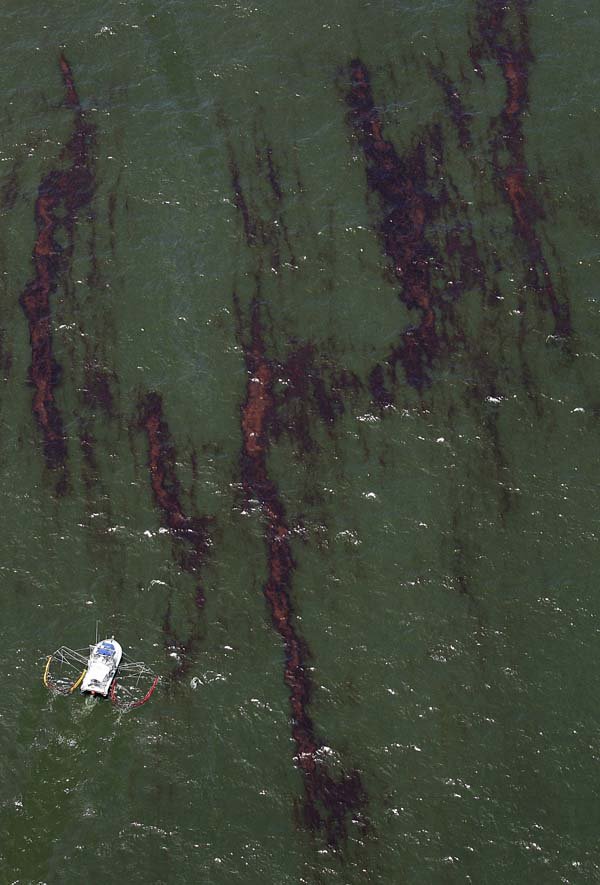NEW ORLEANS — A tropical depression slammed into parts of Mexico on Sunday, but the storm was regaining strength into the night as it moved over warmer waters in the Gulf of Mexico.
Forecasters said the storm still was not on track to hit the BP oil spill on the northeastern end of the Gulf of Mexico, but the firm kept an eye on the storm’s course, as forecasters said a shift in direction could disrupt the firm’s oilspill cleanup effort.
Alex moved into the Gulf on Sunday after weakening to a depression as it swirled across Belize and Mexico’s Yucatan Peninsula, dumping rains that left at least four people dead across the region.
Alex picked up strength Sunday night and again become a tropical storm. Forecasters said the storm could in coming days become a hurricane headed toward Mexico’s Caribbean coast, well away from the oil leak, the U.S. National Hurricane Center in Miami said.
On Sunday, Alex soaked parts of Central America and the Yucatan Peninsula with torrential downpours, forcing hundreds of tourists to flee resort islands. Winds were at 60 mph when the storm made landfall in Belize on Saturday night and were 45 mph Sunday night. At 10 p.m. CDT, Alex was centered near latitude 19.4 north, longitude 91.3 west, or about 60 miles west-southwest of Campeche, Mexico. It was moving toward the west-northwest near 7 mph.
Rains will likely keep falling on southern Mexico and Guatemala until this afternoon, forecasters said.
Any system with winds over 46 mph could force BP to abandon efforts to contain the flow for up to two weeks and delay the drilling of two relief wells that are the best hope of stopping it, Coast Guard Adm. Thad Allen said Saturday, shortly after Alex became the first tropical storm of the Atlantic hurricane season.
The storm appeared likely to miss the oil-slicked region and make landfall in Mexico, apparently in Tamaulipas state - but meteorologists warned that a storm’s track can quickly change.
“We all know the weather is unpredictable and we could have a sudden, last-minute change,” Allen said.
BP and Royal Dutch Shell PLC, the biggest oil producers in the Gulf, were evacuating Sunday nonessential crews from some offshore platforms in the region as a safety precaution because of Alex.
BP removed workers from its Atlantis, Mad Dog and Holstein oil-production platforms in the western part of the Gulf, company spokesman David Nicholas said by telephone from Houston. He said output wasn’t affected. London-based BP’s response to a record U.S. oil spill, located in northern and eastern parts of the Gulf, also is unaffected.
Shell, which evacuated 300 people, sees “minimal impacts” on drilling and production, spokesman Bill Tanner said.
Emergency plans call for moving workers and equipment five days before galeforce winds are forecast to arrive at the half-square-mile containment operation surrounding the blown-out well. Oil has been gushing since the offshore drilling rig Deepwater Horizon exploded 50 miles off Louisiana’s coast April 20, killing 11 workers.
Nearly 39,000 people and more than 6,000 boats are working there, in other parts of the Gulf and on land to skim and corral the oil, protect hundreds of miles of coastline and clean fouled beaches. All of those efforts would have to be suspended if a storm threatened.
At the well, the two systems that have been capturing between 20,000 barrels and 28,500 barrels of oil a day would be unhooked, leaving oil to gush freely into the Gulf again. No one knows exactly how much is flowing, but worst-case estimates indicate it could be as much as 59,500 barrels of oil a day. A barrel equals 42 gallons.
Work would also stop on the two relief wells being drilled to take the pressure off the blownout well, considered the only permanent solution. The first is on target for completion by mid-August, but there could be a significant delay if people and ships come ashore to ride out a storm.
Despite the setback a suspension would represent, “the safety of life is No. 1 priority,” Allen said.
On the Mississippi coast on Sunday, what appeared to be oil from the Gulf spill washed ashore in quantity for the first time, while emergency managers scrambled towin approval for stronger protection of inland waterways, more skimming equipment in Mississippi waters and installation of absorbent material, also to keep oil out of inland waterways.
Out in the Gulf, there is concern about the thousands of feet of protective boom ringing numerous islands and beachfronts. Winds and waves could hurl the material, much of it soaked with oil, deep into marshes and woodlands.
“What boom they don’t pick up - and there’s miles and miles of it, so there’s no way they can pick it all up - willend up back in the marsh,” said Ivor van Heerden, former deputy director of Louisiana State University’s Hurricane Center. Information for this article was contributed by Lisa Leff, Greg Bluestein, Cain Burdeau, John Flesher, Micheal Kunzelman, Patrick E. Jones, Gabriel Alcocer and Pauline Arrillaga of The Associated Press and by Katarzyna Klimasinska, Jens Gould and Mike Harrison of Bloomberg News and by Anita Lee of McClatchy Newspapers.
Front Section, Pages 3 on 06/28/2010
